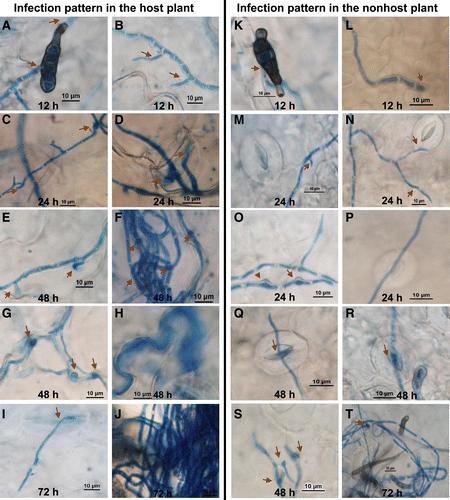
Credit: Urooj Fatima, Priyadarshini Bhorali, and Muthappa Senthil-Kumar
During visits to fields in Assam, Rajasthan and Uttar Pradesh, India, plant biologists Muthappa Senthil-Kumar and Urooj Fatima found mustard plants infested with Alternaria blight disease. They also noticed that an adjacent field of chickpeas were completely uninfected.
Alternaria blight caused by fungal pathogen devastates Brassica crops such as cabbage, cauliflower, broccoli, and mustard seed. Highly infectious, this fungus can infect the host plant at all stages of growth. Currently Alternaria blight is managed by chemical fungicides, but recently efforts have been made to utilize breeding and modern biotechnological approaches to develop blight-resistant crop varieties.
Non-host resistance (NHR) is the most durable resistance against fungal pathogens. While Alternaria typically penetrates the epidermis or the stomata of a host plant, this is unable to deploy this attack on plants protected by NHR. To protect Brassica crops from this fungus, scientists are studying the mechanisms of NHR in order to develop improved crop varieties.
In a study published in MPMI, plant biologists in India detailed their research comparing the response of a host plant (mustard) and a non-host plant (chickpea) to the fungus on a morpho-pathological level. They found that the chickpea actively suppressed the fungal development, penetration, and colonization even after hours of infection.
They also studied chickpea transcripts to pinpoint several genes involved in the plant’s pathogen defense.
“These genes are interesting candidates for additional study to determine their precise involvement in NHR,” said Senthil-Kumar, who conducts research through the National Institute of Plant Genome Research. “These genes could then be transferred to mustard plants to develop blight-resistance crops.”
For more information about this study, read “Morpho-Pathological and Global Transcriptomic Analysis Reveals the Robust Nonhost Resistance Responses in Chickpea Interaction with Alternaria brassicae” published in the December issue of Molecular Plant-Microbe Interactions (MPMI).
###
Media Contact
Ashley Bergman Carlin
[email protected]
651-994-3832
Related Journal Article
http://dx.




